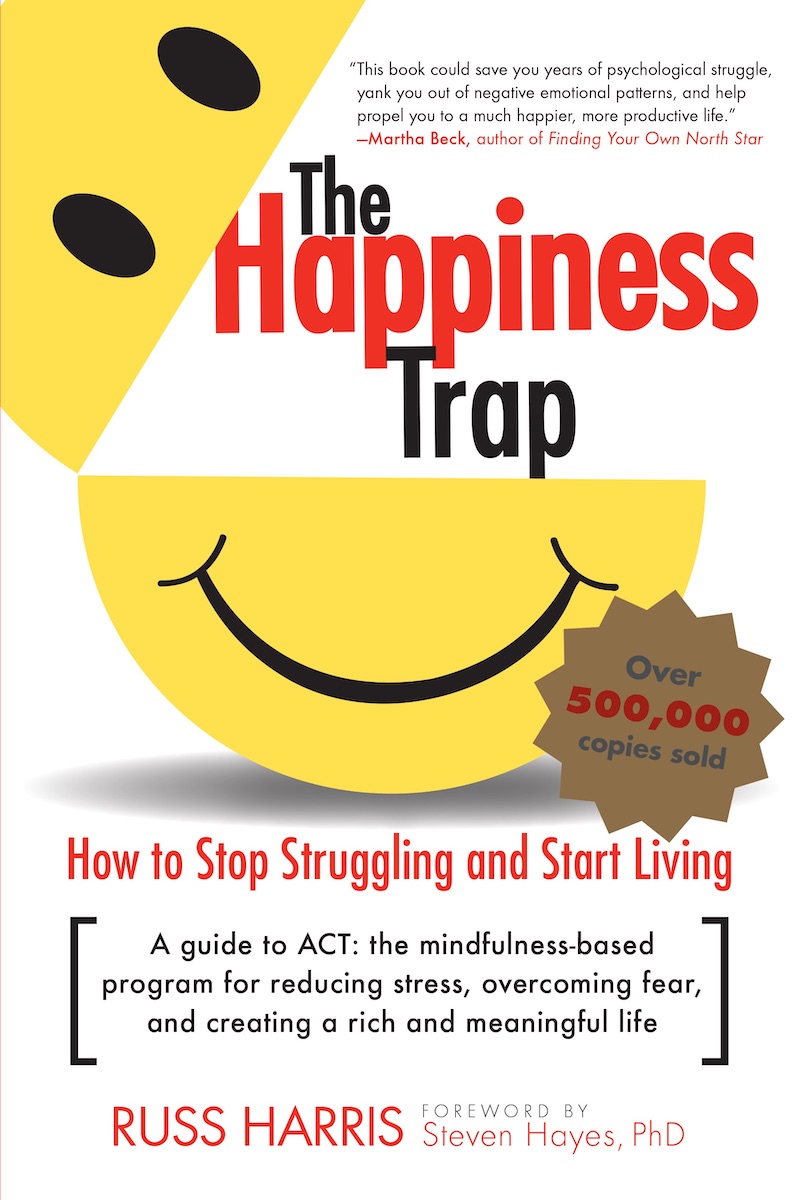
From time to time I share notes about the books I’ve been reading, or have revisited recently after many years.
These posts are meant to help me remember what I’ve learned, and to point out titles I think are worth consulting.
They’re neither formal book reviews nor comprehensive book summaries, but I hope you find them useful. For previous postings, see my Book Notes category.
This is a writeup I’ve been meaning to post for some time. I have consulted this book many times over the years and have drawn a lot from it.
It’s not a new book, having been published in 2008, but I find its lessons to be timeless.
Book Notes: ‘The Happiness Trap: How to Stop Struggling and Start Living: A Guide to ACT.’
Published: 2008
Publisher: Trumpeter
ISBN-10: 1590305841
Amazon link
Brief summary:
Don’t think of “happiness” as it’s commonly understood, which is “feeling good.”
Instead, think of being happy as living a rich, meaningful life in accordance with your values.
My 3 key takeaways:
- Homo Sapiens’ brains have not evolved to make us “happy,” or to produce a constant stream of pleasurable sensations. Our brains have evolved to keep us from getting killed. In the modern world, that threat is less a tiger lurking behind tall grass, waiting to pounce, but rather other perils: falling sick, encountering difficulties on the job, or suffering from declining social status.
- Don’t believe in fairy tales, such as the notion that things should end “happily ever after.” In truth, we have little control over our emotions and thoughts — but that’s okay. Thoughts are just words that run through our heads. Emotions are like the weather: they’re always changing. The mind (the neutral, “observing self”) is like the sky: it’s always there, regardless of thoughts or emotions.
- What is the “happiness trap” referred to in the title? It’s thinking that happiness means “feeling good.” Rather than making ourselves miserable chasing positive sensations — and trying to resist negative ones — we must understand that real happiness means living a meaningful life. And what is a meaningful life? It’s when our actions are in line with our most important values.
My notes and notable quotations:
- The book is a blend of mindfulness, cognitive behavioral therapy techniques, and even what might be considered Buddhist philosophy. It is based on a form of therapy pioneered by psychologist Steven C. Hayes called Acceptance and Commitment Therapy, or ACT (pronounced “Act”), which is designed to create “psychological flexibility.” (It strikes me that it’s a combination of Western-style focus on what we as individuals want out of the world, and an Buddhist-style focus on detachment.)
- “If we live a full life, we will feel a full range of human emotions.” (P. 5)
- There are six principles for dealing with thoughts and emotions:
- Defusion: disconnecting from our thoughts, and not fusing with them. For example, if you are ruminating, try thinking: “I notice I’m having the thought that…” This will give you a sort of psychological distance from the thought, providing relief.
- Expansion: making room for our emotions, not fighting them.
- Connection: being present in the here and now.
- The observing self: the part of us that is “pure awareness.”
- Values: discovering and staying true to what’s important over our lifetimes. These aren’t goals, but ways of acting.
- Committed action: taking steps to act in accordance with your values.
- Hayes summarizes what ACT teaches us in this way: We must accept thoughts and feelings and be present, connect with our values, and take effective action. “So here is the happiness trap in a nutshell: to find happiness, we try to avoid or get rid of bad feelings, but the harder we try, the more bad feelings we create.” (P. 27)
- “Success in life means living according to your values.” (P. 221). Values aren’t goals, which can accomplished and checked off a list. They’re “leading principles” for your life.” Or, “how we want to be, what we want to stand for.”